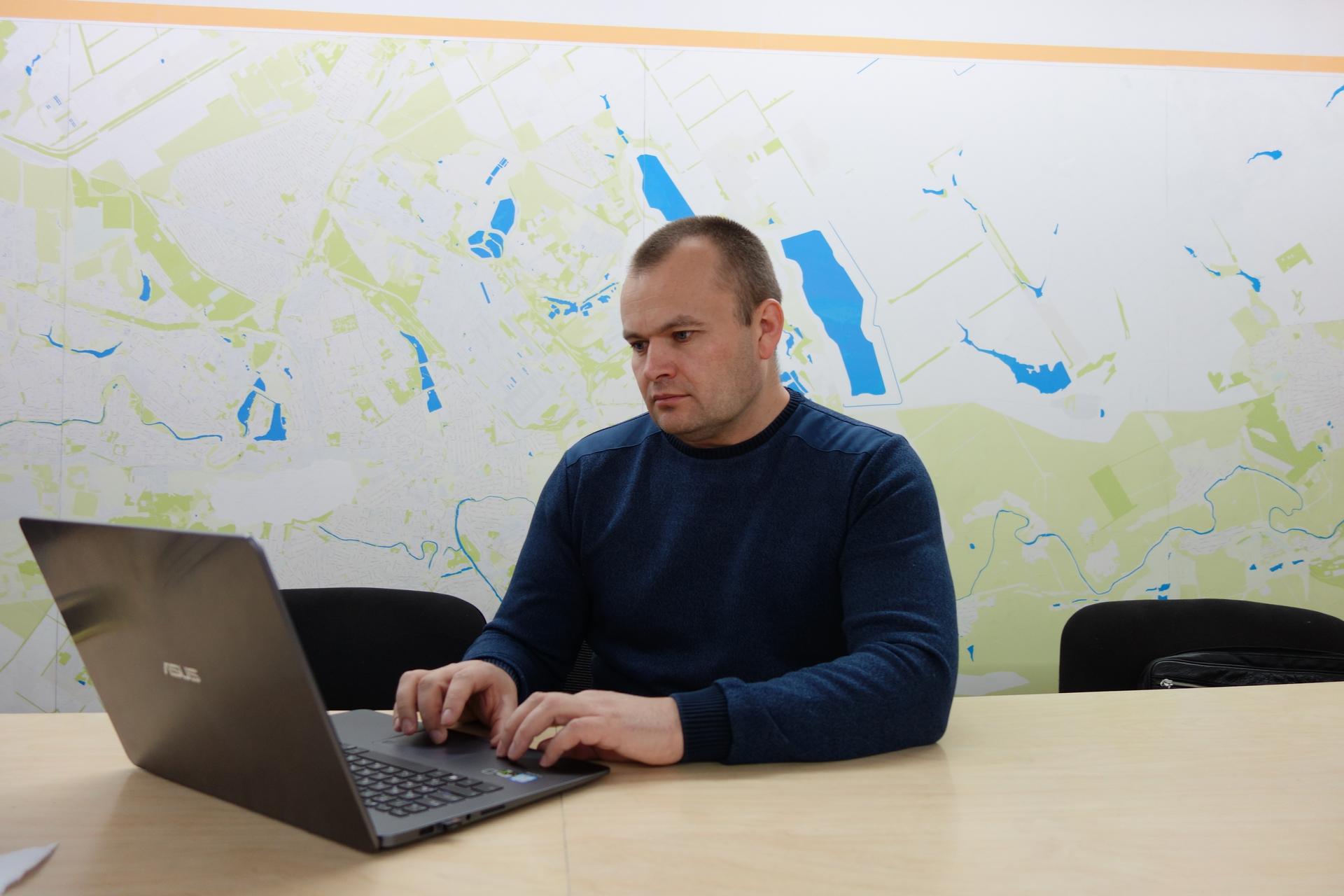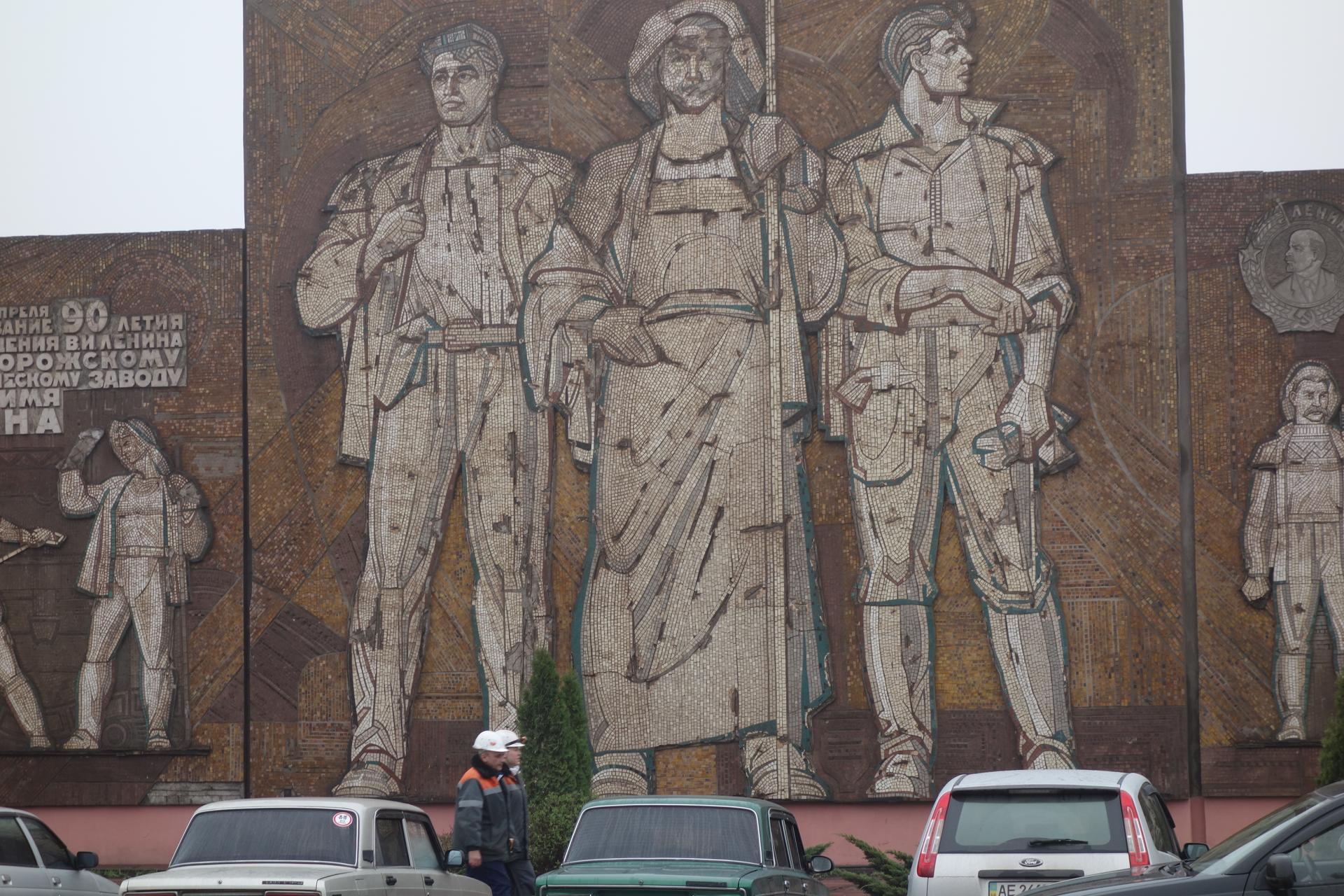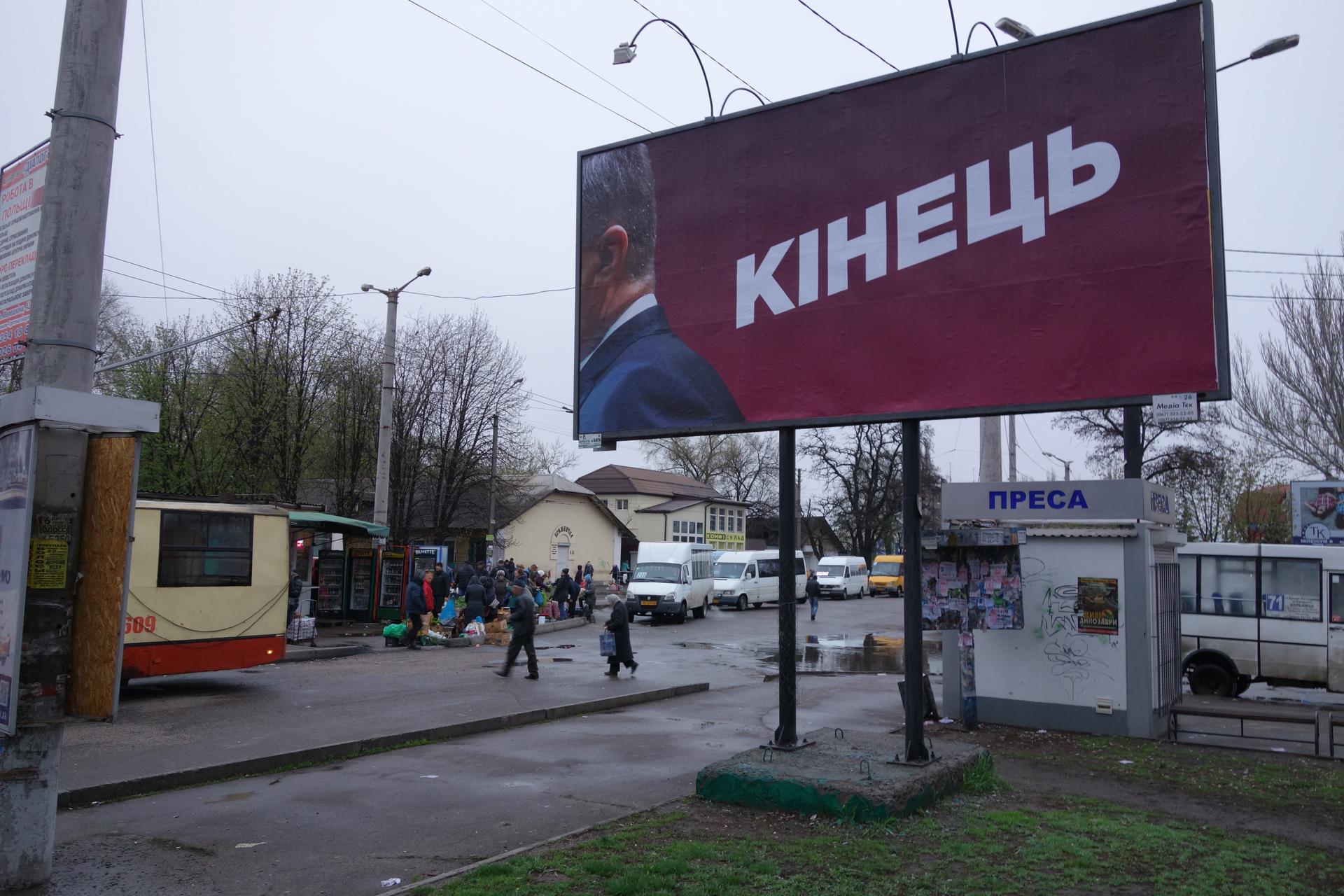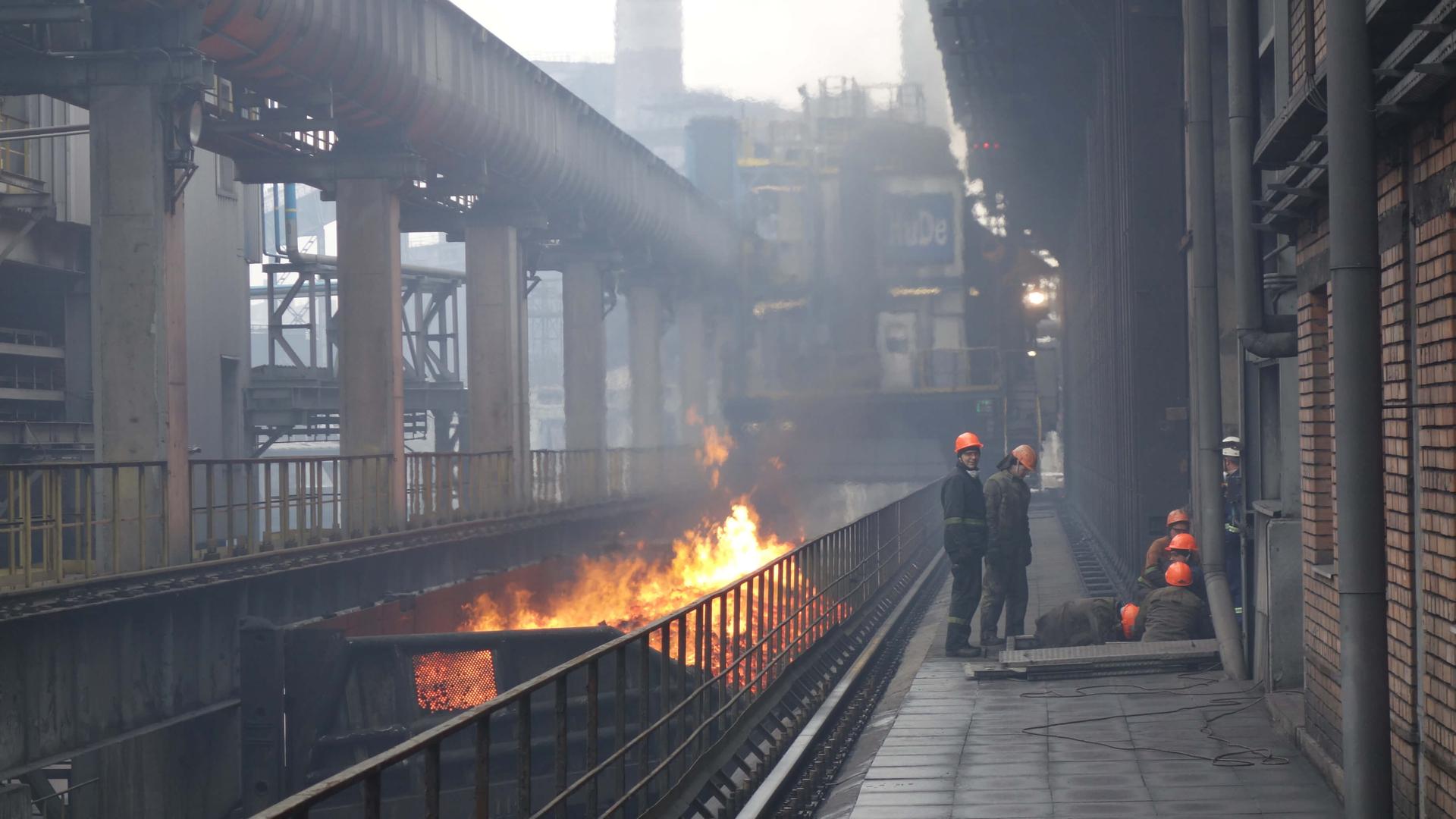A struggling mining town in Ukraine looks to one of their own as leading presidential candidate
Workers from ArcelorMittal Kryvyi Rih stand next to burning coke in the industrial eastern Ukraine city of Kryvyi, Rih, on April 17, 2019. With more than 23,000 employees working in iron mines, ore and coke processing facilities and steel workshops, the company is one of two economic giants in the city.
Yury Milobog, a local deputy in the industrial city of Kryvyi Rih in eastern Ukraine, likes to tell the story of how he once helped presidential hopeful Volodmyr Zelenskiy participate in a comedy show in Russia.
It was 1998, and then 20-year-old Zelenskiy had just created 95 Kvartal, or Quarter 95, a comedy group named after a Kryvyi Rih neighborhood.

“He was straightforward, so I decided to help him,” Milobog says.
He gave the group a hundred dollars to pay for the train to Sochi, a seaside resort in southern Russia where the competition took place. It wasn’t for nothing: 95 Kvartal would end up winning multiple seasons of KVN and make its “captain” — Volodymyr Zelenskiy — Kryvyi Rih’s most famous personality.
Now, the possibility of Zelenskiy’s win in Ukraine’s presidential elections has catapulted Kryvyi Rih into the spotlight, an unusual situation for this remote, industrial city.
Polls conducted between Ukraine’s two election rounds now see Zelenskiy poised to win the presidency on Sunday, April 21, by a landslide, with several surveys saying the comedian could capture more than 70% of the vote. In the first round on March 31, polling stations across Kryvyi Rih recorded votes of over 50% for the comedian, while incumbent president Petro Poroshenko was unable to gather more than 7% of the vote.
Related: This Ukrainian presidential candidate is challenging language divisions with a message of unity
Neither Milobog nor anyone in the city expected Zelenskiy to become known as a political figure who, in early 2019, jumped into Ukraine’s presidential race despite a total local of experience, and went on to emerge as the surprise front-runner of the election.
“We are a bit isolated from the rest of Ukraine, people are focused on themselves here,” says Yuliy Morozov, a local activist.
Kryvyi Rih is one of Ukraine’s largest metallurgical centers and the nation’s biggest city without the status of regional capital. The 62-mile long city is surrounded by quarries, iron mines, steel and coke-processing facilities that expanded by following the region’s rich iron deposits. It is also one of Ukraine’s most polluted areas — the town registers one of the highest rates of lung cancer in Ukraine.
Kryvyi Rih stands almost unanimously behind Zelenskiy, hoping their hometown candidate will make much-needed changes to improve the depressed economy.
Zelenskiy’s victory is all but certain here, but it’s not just because of the comedian’s origins: Alexander Vilkul, another presidential candidate in the first round with established roots in Kryvyi Rih — his father is the mayor — registered returns far below Zelenskiy’s.
“People are disappointed,” explains Elena Krivoruchkina, a professor at Kyiv State Economic University and a volunteer at Zelenskiy’s local campaign office. “They work in mines, in difficult conditions, and they haven’t seen anything change.”
Like the rest of Ukraine, the main driver of the Zelenskiy vote isn’t necessarily the comedian himself, but rather a rejection of Poroshenko. Speaking just before a conference organized on the post-industrial future of Kryvyi Rih, activist Morozov says “there were huge expectations in 2014 [for Poroshenko] and then an equally huge disappointment.”
In the aftermath of the 2014 Euromaidan revolution, which saw the ousting of then-president Viktor Yanukovych, times were tough for Krivhy Rih residents. Ukraine entered a deep economic crisis that swept the city as Russia annexed Crimea and started propping up separatist groups in eastern Ukraine that eventually captured and held sway of territories.
Related: Ukrainian Orthodox Church gains independence from Moscow
“It was difficult,” recalls Serhiy Plichko, the chief financial officer of mining company ArcelorMittal Kryvyi Rih branch. With more than 23,000 employees working in iron mines, ore and coke processing facilities and steel workshops, the company is one of two economic giants in the city — along with rival Metinvest, a steel-making company owned by Ukraine’s richest man, Rinat Akhmetov.
Known as Kryvorizhstal until 2005, ArcelorMittal traces its roots back to the Soviet times — its impressive mural praising Lenin and Soviet workers at the company entrance makes this history clear.

The company used to import a sizeable portion of the coal needed for its coke production from regions of Ukraine that are now outside government control. This has forced management to find new sources of coal in the US and, Plichko admits after a long pause — Russia. The company’s spokesperson later added Kazakhstan to the list.
At the same time, tensions over work conditions rose inside the company, and strikes erupted in 2017 and again in 2018, at which time the steel giant agreed to increase its payroll by 30%.
Could the election of homegrown Zelenskiy as president lead to a significant change in the struggling city?
“I hope,” answers Sergey Barabashuk, the local head of an independent miner trade union.
A miner for 13 years and union leader for two and a half years, Barabashuk is keeping his expectations low. Most mines are refusing to invest in new equipment and working conditions have barely changed since he started working, he says. Some mining specialists can make up to $1,000 a month, but Baranashuk says the average salary remains below $500 a month, too low for such a dangerous job. Back in February, two workers were found dead in an iron mine north of the city.
Related: Ukraine’s ultranationalists are at the polls, even without a candidate
Krivoruchkina, the volunteer at Zelenskiy’s office, believes environmental protection is one area where the new president could enact some changes. But she also remains cautious: “Things won’t change in a day,” she says.

Migobolov says the first round of the presidential election was the “cleanest” the city had seen since Ukraine’s independence from the Soviet Union and that fraudulent elections like the ones he saw when he ran for mayor in 2014 “would be much harder to do today,” due to overall greater transparency.
But the local deputy who helped finance Zelenskiy’s trip to Sochi back in the ’90s, says he won’t go to the polls on Sunday. Poroshenko failed to reform the country, he believes, but Zelenskiy might prove too weak a figure to govern efficiently.
